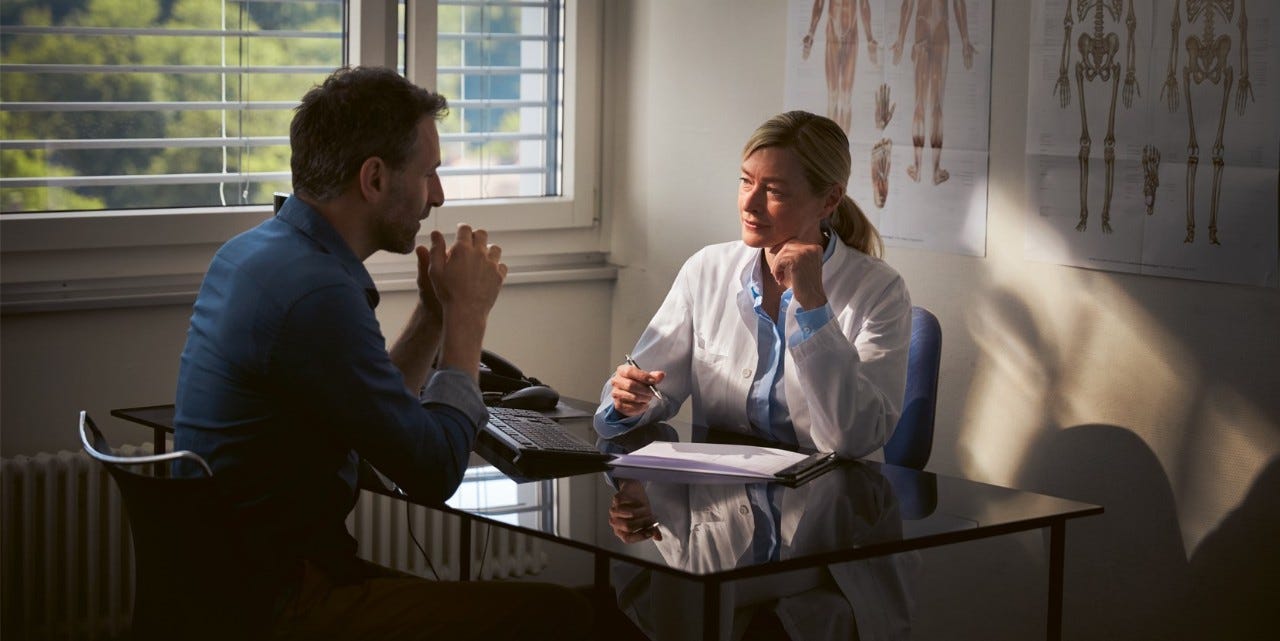Hereditary diseases: Do a genetic test or not?
Genetic testing can find changes in genes that cause health problems. But do we really want to know? We look at the pros and cons of genetic testing.

Anna Gebhard* is mum to two daughters in wheelchairs. Before puberty, the older daughter was diagnosed with gross motor difficulties. An initial evaluation by neuropaediatrics led to a diagnosis of cerebral palsy. But as the symptoms increased and her younger sister suddenly showed the same abnormalities, Anna requested a whole-genome sequencing analysis for her children, her husband and herself. The results were life-changing. The tests revealed that both girls suffer from a rare, inherited form of neurodegenerative disease. It was clear that the children would need Anna’s help their whole lives.
Knowledge of hereditary diseases: Parents and their feelings of guilt
Anna was floored by the diagnosis. because it was only through the genetic testing that she discovered that both herself and her husband were carriers of a gene defect that triggered the disease in their daughters – a disease that Anna didn’t even know existed. Would Anna have started a family if she’d known about the risk posed by her gene pool? After a long pause, Anne replied “Honestly, if I’d known that we were both carriers of this disease, I probably wouldn’t have taken the risk of having children.” Many parents with hereditary risk factors feel guilty when their own children become terminally ill. As Anna didn’t know about the hidden genetic mutation, she doesn’t feel guilty about passing on the disease. "I simply didn't know about the increased risk of a hereditary disease." She also couldn't imagine what it would have been like to live with the psychological burden of waiting for the onset of the hereditary disease. “Sometimes I feel it is so unfair that, unlike them, I am healthy, I can move without restriction and do everything else that I want.”
Networking is an important anchor for people with hereditary diseases
When it sometimes all gets a bit too much, Anna turns to the network of families caring for relatives that she has built up via contact and self-help groups. She has learned over the years that networking is essential, also financially, because chronically ill children need 24/7 care. Being essentially a full-time carer means that it is practically impossible for parents to work. Anna gave up her job as an accountant a year ago. She finds it incredibly unfair that the care services provided by parents are not recognised or compensated in any way. “Children want to be looked after by family members, not strangers. But relatives are not recognised as carers, and they get no money for all the care work they do. If we were to send our children to a facility, such as a care home, the insurance would cover the costs. It’s a preposterous situation.”
Despite hereditary disease: giving up is not an option
What gives Anna strength? “Hope”, says Anna. “That’s the only thing we still have. When the children were first diagnosed, we had a lot of hope, because there were a few trials being conducted on a lot of very rare diseases.” Six years after the diagnosis, Anna is deflated. Three of the promising trials weren’t approved, and the other trials didn’t get anywhere. “The fact that a real cure is only possible through a genetic change means that there is really very little hope for this outcome.” With incurable diseases, therefore, the positive results of genetic tests are more about giving parents more time to provide for when the illness hits.
* We have used a pseudonym to protect Anna and her family.
Rare diseases: facts and figures
So far, between 6,000 and 8,000 rare diseases have been identified worldwide. A disease is deemed to be rare if it affects no more than five out of every 10,000 people. It is estimated that 5 to 8% of the Swiss population are affected by a rare disease, that is between 500,000 and 600,000 people. Around 50% of those affected are children and young people. Due to their very nature, it is often difficult for doctors to diagnose these diseases in good time and to provide the appropriate treatment. This brings with it major challenges: parents are pushed to their limits, siblings can feel left out, financial worries, struggles with insurance companies and social isolation.
Association for rare diseases: www.kmsk.ch
National Coordination of Rare Diseases: www.kosekschweiz.ch
Swiss Academy of Medical Sciences: www.samw.ch
Three questions for Dr Bettina Henzi
Dr. Bettina Henzi is a neuropaediatrician at the University Children’s Hospital Basel.
Which genetic tests are useful from a medical point of view?
With regard to prenatal diagnostics, the regular pregnancy tests should be carried out in any case. Otherwise, it makes sense to carry out genetic testing if there are existing risk factors. In these cases, it is important to discuss with the parents what should be done and what the consequences of testing may be. If a child is born with no symptoms, genetic testing is not permitted based on family history, unless it would lead to immediate therapeutic treatment. Genetic counselling should be provided by a genetics specialist, during which the benefits and risks of genetic testing will be discussed in detail. In cases of known genetic diseases with established therapies and testing strategies, it may be appropriate to perform genetic testing for the known disease.
All our genetic make-up is subject to a certain genome mutation rate, which is why sufferers of rare diseases often aren’t even aware that they are a carrier of a monogenic disorder. Is not knowing a blessing or a curse?
Not all hereditary diseases are passed on in the same way, and not every change in our genetic make-up causes a disease. That’s why it is not possible to generalise about whether it’s a blessing or a curse. The situation varies greatly from person to person. Targeted therapies are now available for some genetic diseases that are most effective when they are early. Early detection of the disease and subsequent genetic advice are very important here.
A diagnosis is life-changing for both the patient and their parents. What support is available for families?
When a diagnosis is made, open and honest communication is very important. It must be made clear right at the beginning and throughout the process that the parents or individual parents are in no way to blame. An interdisciplinary team at the clinics can provide families with genetic advice. It is also important to put families of patients in touch with one another. Although the individual diseases may be rare, when looking at the whole picture they are more common than you might think. Sharing with each other can reveal resources, provide further information on the specific disease and give hope. The treatment team also seeks to provide families with the best possible care and address their individual needs.
The interviewee Dr Bettina Henzi works in neuropaediatrics at the University Children’s Hospital Basel UKBB.


